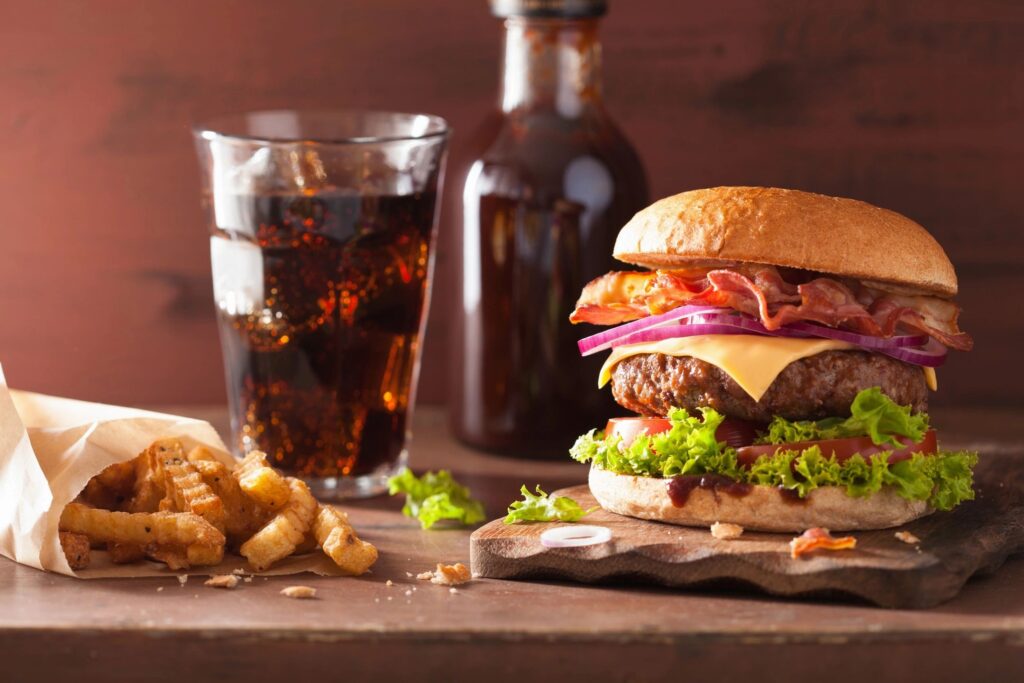
I occasionally eat fast food and, perhaps, so do you. Cheers! There is a lot of contrary data about diet out there. There are many theories being proposed. Almost all of them are half-baked and not really thought through, hence the layman, meaning you, can get very confused if the experts can’t even get it straight.
Here is the deal: nutrition is an evolving subject. We, the experts, are still learning about it, so no one, not even me I’m sorry to say, has it all down pat. I have spent over 40 years sorting out truth vs. speculation in this area. I have been diligently working at it through study and tens of thousands of office visits over the last 17 years.
So, based on the above investigations here are a few pointers to guide you to more abundant health.
1. Eat as much raw food as possible – at least 50% of your total diet. There are numerous references on this. The founder of Standard Process, Dr. Royal Lee, talked about this frequently, starting in the 1930s. Enzyme Nutrition by Dr. Edward Howell is a great 150-page book to read. All human metabolism occurs – each step of it – because of this enzyme or that enzyme. Cooking destroys enzymes. A rare steak is healthier than a medium steak, which is healthier than a well done steak. Cook pork well done. Fresh, raw or frozen fruit is far better than cooked fruit. You get the picture. A raw diet gives you energy and builds and cleanses the body. A cooked food diet slowly clogs and degenerates the body.
2. Eat lots, and a variety, of organic vegetables and wild caught fish. Grass-fed animals are vastly superior to commercially raised animals. Organic vegetables contain far more minerals than commercially grown vegetables. This is a matter of experimental fact, not opinion. Minerals work as co-enzymes in the body or as structure in the body. The increase in the price of organic vegetables is worth it. Trader Joes is a food market that has many organic vegetables, grass-fed beef and raw milk cheddar cheese at reasonable prices. Organic fruits and nuts are superior to non-organic, but perhaps, in this case, buying organic is not as important as it is with vegetables.
3. Avoid processed foods as much as possible. For example, if you want to eat oats, buy whole oats at the health food store and cook them just like oatmeal. Steel cut oats are the next best thing to whole oats, but once you cut the oats, oxidation starts to occur and the fats in the grain start to go rancid as soon as the vitamin E or other antioxidants are used up by their interaction with air. Oatmeal, quick oats and granola are pretty much going rancid by the time you get them. Your body is unnecessarily stressed when dealing with this in order to get whatever value is left in the food.
4. Frozen foods are pretty good, but you want to eat them as soon as possible once you thaw them. It is best to lightly steam frozen vegetables, just until they are hot.
5. Whole grain products, such as breads, should be made from freshly milled flour and immediately made into bread. The La Brea Bakery and the Ezekiel Breads are good products which are available her in the Los Angeles area. Ask your grocer about other such quality baked products.
6. Alcohol – Limit it as much as possible. Even one glass of wine a day will slow you down mentally and physically, though one glass of red wine a day does not have a negative effect on your overall physical health. If you like alcohol, try to limit it to a social gathering.
7. Tobacco – statistically, smokers have a rougher time health-wise. Nicotine is, biochemically, considered to be a nerve toxin. Dark chocolate with minimal sugar is a far better habit and dark chocolate improves the microcirculation of blood.
8. Omega 3 fatty acids are anti-inflammatory. Northern people tend to do great with fish oils. Mediterranean people may do better with more flax oil and less fish oil. Avoid the processed oils you find in the grocery stores. Bottles of extra virgin olive oil or oils with the word “unrefined” on the label are okay. Hydrogenated fats, margarine, Crisco-like fats and baked goods containing these synthetic fats are awful for your health. Deep fried foods should be avoided, though I know an occasional order of fries can be hard to resist.
9. There is no valid data anywhere that animal products are bad. However, it is usually cooked and we may over-consume it. A book titled The China Study, tried to prove that animal protein caused cancer and heart disease. The problem with this study is that many equally important factors were ignored in coming to that conclusion. Further, we tend to only eat the flesh and avoid the organs, bones and glands, all of which contain special rare nutrients. Many of our food concentrate products (supplements) contain these raw organ or gland extracts. There is no valid data anywhere that man has ever naturally been vegetarian or vegan. If you know of such data, let me know. Raw, fertile eggs are a great source of protein and fat, and they contain fibroblast growth factor (FGF). Fibroblasts help the body build new cells.
10. Raw nuts, grains and beans are good non-animal sources of protein. In the nut family, peanuts, almonds and brazil nuts are highest in protein. Garbanzo, black and pinto beans are highest in protein among beans with 2 to 3 times the protein of many beans such as kidney beans. Books such as the Nutrition Almanac contain charts of food values. Some soak these products for a day and then eat them.
Soy is very high in protein but it has to be soaked and the water drained at least 4 times for 4 hours each time to eliminate anti-enzymes in the soybeans. This practice is very rare in the USA in the soy products you might buy. With soy, after 4 soakings you can blend them in water to make healthy high protein raw soy milk. Add some raw honey or molasses for taste or blend in raw fruit.
That should cover most of the important facts about food. Many supplements are synthetic, especially the B vitamins. Others are nutraceutical, (a super extract usually by chemical means of one or a few biochemical molecules from a food) in nature, especially ascorbic acid and vitamin E. Because of the consumption of processed food, 400-800 IUs of vitamins E and 500-1000 milligrams of vitamin C are useful. C is actually converted chemically from corn syrup to ascorbic acid. Primarily, use whole food concentrates providing the complete profile of rare nutrients to keep your body young and fully functional. Have success creating your health!
If you like everything in this article, convert step by step, not all at once.
Dr. Mike Spearman

